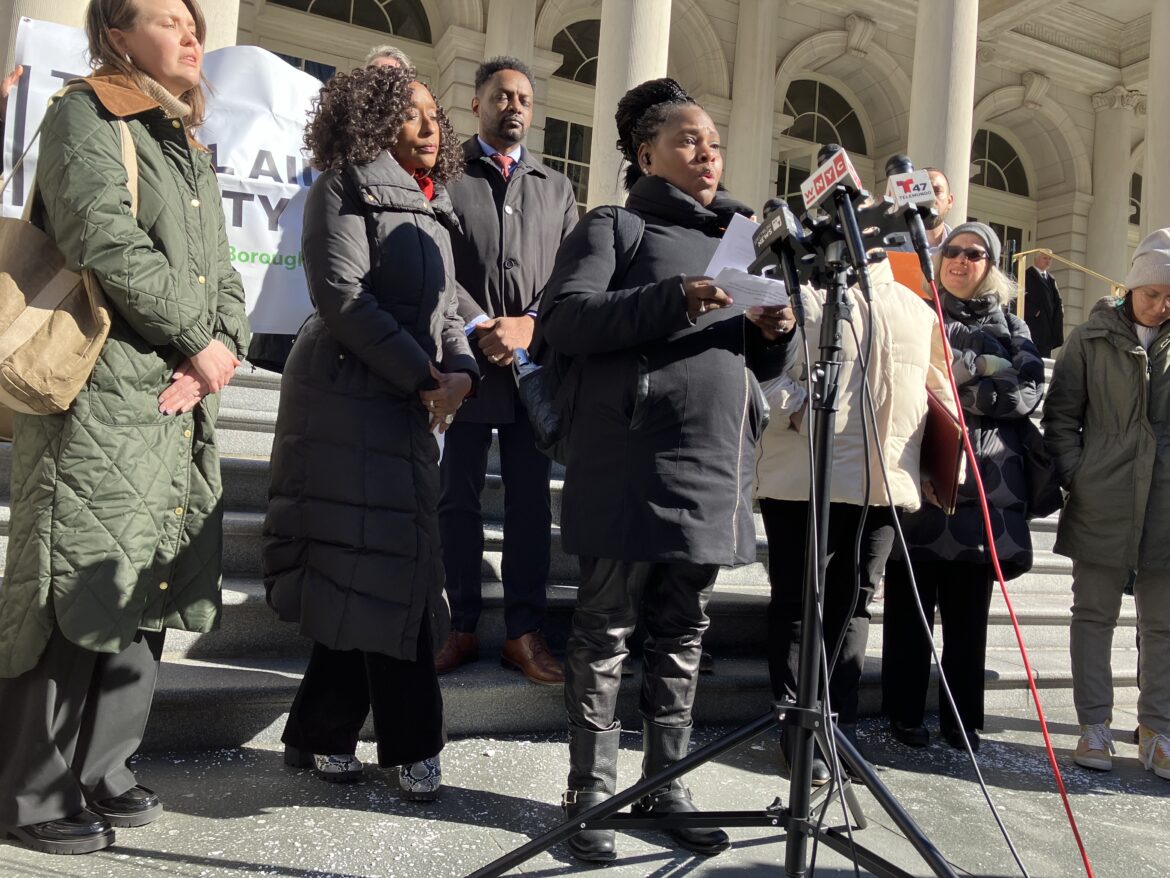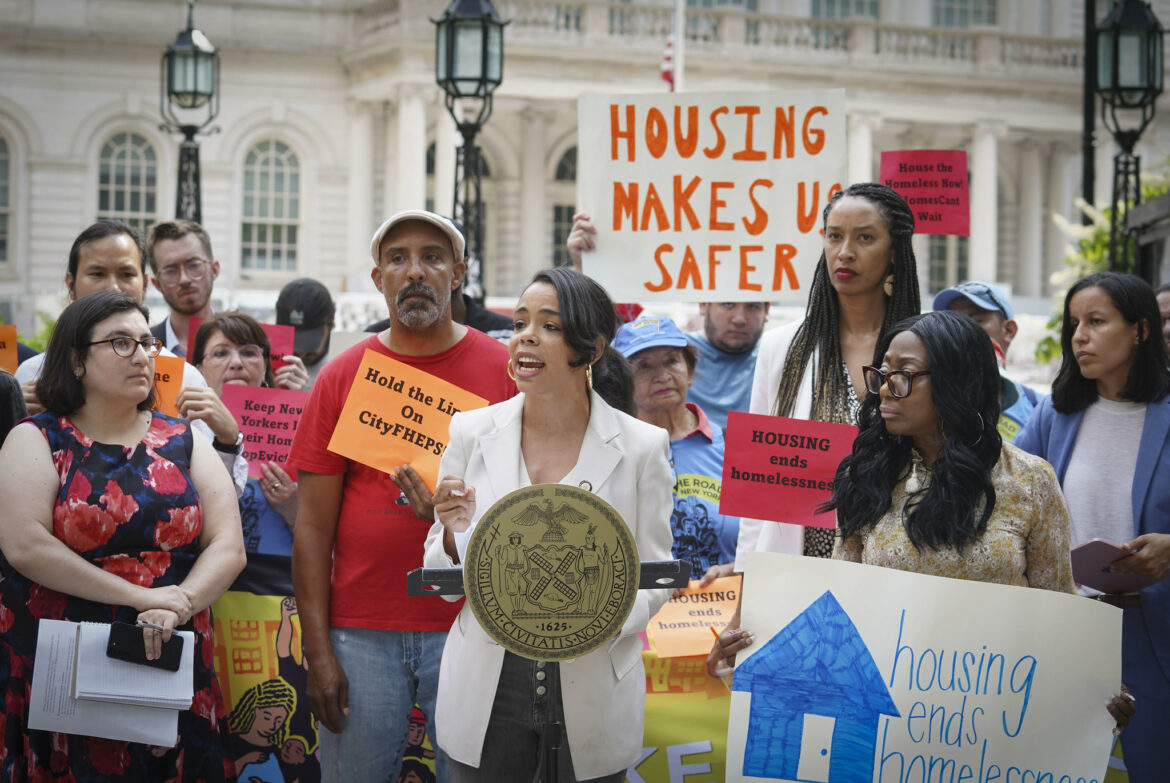The proposed class action suit was filed in New York State Supreme Court on behalf of four New Yorkers who say they should be eligible for CityFHEPS, but are closed out because the Adams administration has failed to implement laws expanding the program.

Emma Whitford
Marie Vincent, center, a cancer survivor living in a Harlem shelter with her grandson, is one of the plaintiffs in the Legal Aid suit.The Legal Aid Society announced Wednesday that it is suing Mayor Eric Adams’ administration over its failure to implement several laws passed by the City Council to expand eligibility for the city’s housing voucher program.
The lawsuit is the latest in an ongoing dispute between the mayor and the Council over reforms to the City Family Homelessness and Eviction Prevention Supplement (CityFHEPS) program, which allows tenants to pay up to 30 percent of their income on rent while the city covers the rest, up to a fixed maximum.
Legal Aid’s proposed class action suit was filed in New York State Supreme Court on behalf of four New Yorkers who say they should be eligible for CityFHEPS, but are closed out because the Adams administration has failed to implement laws expanding the program.
Speaking outside City Hall Wednesday morning, Judith Goldiner of the Legal Aid Society said the lawsuit is simple, with the goal of compelling City Hall to enforce the legislation. “These are laws, they are not discretionary. The mayor has to obey them, like the rest of us have to obey laws that are passed,” she said.
The plaintiffs include Marie Vincent, a cancer survivor living in a Harlem shelter with her grandson who would qualify for a rental voucher under the Council’s Local Law 100, which raises the income ceiling for CityFHEPS applicants.
“I work nights doing housekeeping at a local hospital, but because my income is above the level for CityFHEPS, I do not qualify for a housing voucher,” she told reporters Wednesday, adding, “I feel punished for making a living.”
Three other plaintiffs are tenants at risk of eviction, including Susan Acks, a disabled 66-year-old who has lived in a stabilized apartment in Brooklyn for 40 years, but has been unable to afford the rent since her roommate moved out in early 2023.
They could benefit from the Council laws, which extend voucher eligibility to any income-qualifying household at risk of eviction.
“If Mayor Adams would implement the laws duly enacted by the City Council, their housing needs would be met—no more sleepless nights and shelters, no more trips back and forth to housing court and no more harassing calls from landlords and management companies,” Adriene Holder, the chief attorney in Legal Aid’s civil practice, said outside City Hall.
“Mayor Adams on many occasions frequently touts that his administration follows the law. Earlier this month, he stated that that was a rule of his—well, his own rule sounds pretty fluid,” Holder added.
While the City Council approved a resolution last week clearing Speaker Adrienne Adams to take legal action on its behalf over City Hall’s inaction on the bills, the body did not join Legal Aid’s suit, though several lawmakers stood with the organization at a press briefing Wednesday morning.
“We haven’t decided yet; we’re still exploring our options,” City Councilmember and Deputy Speaker Diana Ayala said. “Obviously, we believe strongly that the plaintiffs that filed this suit need to be front and center.”
The Council passed the package of interrelated bills last year to allow more New Yorkers to apply for CityFHEPS, including people living in shelters outside the traditional Department of Homeless Services (DHS) system, as well as tenants facing eviction—what supporters say would help more New Yorkers avoid homelessness in the face of an extreme affordable housing shortage. The bills would also raise the income ceiling for CityFHEPS eligibility and eliminate work requirements.
While City Hall has since implemented portions of the reforms—nixing a 90-day waiting period, and allowing tenants to use their CityFHEPS subsidy to cover utility bills—the administration has refused to move on the rest, citing “substantial financial, operational and legal issues.”

Gerardo Romo / NYC Council Media Unit
Councilmember Pierina Sanchez speaks at a rally in support of CityFHEPS expansion ahead of the council’s veto override this summer.Cost estimates for implementing the expansions vary widely: an analysis by the Independent Budget Office (IBO) said it could run anywhere from $3 billion to $36 billion over five years, while City Hall projects it would cost $17 billion.
At a press briefing Tuesday, Mayor Adams reiterated his argument that the reforms would make it harder for existing voucher holders to use their subsidies, pointing to a historic scarcity of rental apartments across the city.
“Not only are we dealing with a cost factor, but we have a shortage of housing,” he said. “So, you aggravate the problem when you’re now going to give thousands of more people vouchers to compete with those who will have vouchers in their hands.”
The package of bills may also impede on the state’s authority, the mayor has said—an argument that’s worked for prior administrations. In 2006, New York’s highest court sided with then Mayor Michael Bloomberg in his refusal to implement a bill extending health benefits to domestic partners, saying it violated state and federal law.
“The Council’s bill will only make it harder for New Yorkers in shelter to move into permanent housing. Furthermore, the bills violate state law as they seek to legislate in an area where authority is reserved to the state,” a City Hall spokesperson said in a statement in response to the suit Wednesday.
The mayor’s office cited other efforts the administration has made to move more homeless New Yorkers into permanent housing, including allowing voucher holders to use their subsidies outside the city and a plan announced last week to speed up the construction of 1,000 units for CityFHEPS participants in shelter.
But the bills’ supporters dispute Adams’ assertion that the legislation is at odds with state law, pointing to past reforms the city has made to the program without incident, such as raising the value of rental vouchers in 2021.
“From our perspective, and the research that we’ve done, the passage of the laws and the override was sound, well within the boundaries of the charter, and state and city law,” said Robert Desir, a staff attorney with Legal Aid’s Civil Law Reform Unit.
To reach the reporter behind this story, contact Emma@citylimits.org. To reach the editor, contact Jeanmarie@citylimits.org









One thought on “Legal Aid Sues Mayor Adams Over Inaction on Rental Voucher Reforms”
Hey how you doing my name is Mr Muhammad Ali 311 take me out of the house because it’s illegal I was living in the basement for 2 years show me the show that I’ve been there for they told me 2 weeks we should put you in the apartment they lied to me it’s been one year I need help getting my voucher movie to apartment